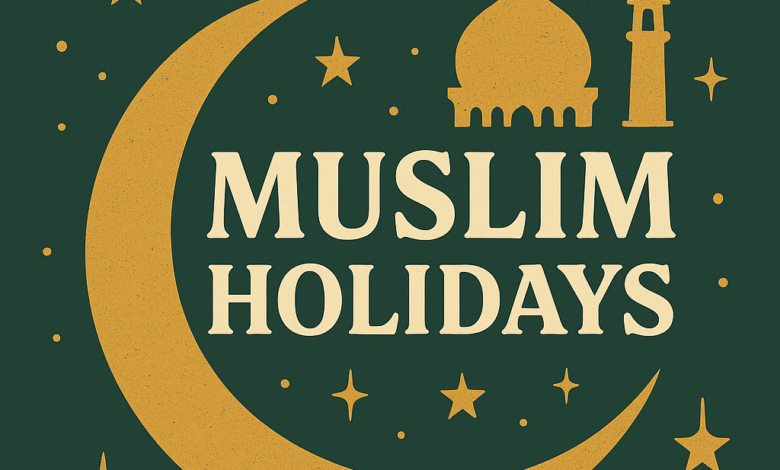Introduction to Muslim Holidays

Muslim holidays are more than just religious events—they’re deeply rooted traditions that blend faith, culture, and community. For Muslims around the world, these special days mark significant spiritual milestones and offer time for reflection, gratitude, and family bonding. Unlike Western holidays which follow the Gregorian calendar, Muslim holidays are based on the lunar Islamic calendar, meaning the dates change each year. This shifting timeline brings an added sense of anticipation and spiritual renewal.
Understanding Muslim holidays is essential not just for Muslims, but for anyone interested in the diverse cultural practices across the globe. From feasting with family to fasting in solitude, each holiday has its own rituals, significance, and stories. What’s beautiful about these holidays is how they connect millions of people across continents, uniting them in shared beliefs and age-old customs.
Even if you’re not part of the Islamic faith, learning about these holidays can deepen your appreciation for Muslim communities worldwide. It’s an enriching experience to see how faith influences everyday life, and how people find joy and meaning in their religious practices.
Eid al-Fitr – The Festival of Breaking the Fast
Eid al-Fitr is arguably one of the most well-known Muslim holidays. It marks the end of Ramadan, the holy month of fasting, prayer, and spiritual discipline. After 29 or 30 days of fasting from sunrise to sunset, Muslims come together to celebrate Eid al-Fitr with prayers, feasts, and community gatherings. The name “Eid al-Fitr” literally means “festival of breaking the fast,” and it truly is a joyous occasion.
The morning of Eid begins with a special prayer held in mosques and open fields, where Muslims gather in their best clothes to offer thanks to God for the strength to complete Ramadan. It’s a highly spiritual moment filled with gratitude and communal unity. After prayer, people greet one another with the phrase “Eid Mubarak,” meaning “Blessed Eid,” and the rest of the day is filled with food, laughter, and giving.
One of the central aspects of Eid al-Fitr is charity. Muslims are required to give Zakat al-Fitr, a form of alms that ensures the less fortunate can also enjoy the festivities. This charitable aspect of the holiday underscores Islam’s emphasis on compassion, generosity, and social responsibility. Families also exchange gifts, visit relatives, and host lavish meals—making it a wholesome, family-oriented celebration.
Eid al-Adha – The Festival of Sacrifice
Eid al-Adha, also known as the “Festival of Sacrifice,” is the second major Islamic holiday and is often considered more significant in terms of religious importance. It commemorates the story of Prophet Ibrahim (Abraham) who was willing to sacrifice his son as an act of obedience to God. Just before he could carry out the command, God intervened and provided a ram to sacrifice instead.
This story of submission, faith, and divine mercy is central to Eid al-Adha. Muslims who can afford it will sacrifice an animal—usually a sheep, goat, cow, or camel—and distribute the meat among family, friends, and those in need. This act of sharing reinforces the Islamic values of compassion and community welfare. The sacrifice isn’t just a physical act; it symbolizes giving up something valuable for the sake of God and striving to be more selfless.
Like Eid al-Fitr, this holiday also begins with a communal prayer and is followed by feasting and family time. However, Eid al-Adha is closely linked with Hajj—the annual Islamic pilgrimage to Mecca. Those who are on pilgrimage celebrate Eid in Mecca, while Muslims around the world participate in their own communities. It’s a holiday that’s both deeply spiritual and socially significant, weaving together elements of devotion, tradition, and mutual care.
Ramadan – The Sacred Month of Fasting
While not a holiday in the traditional sense, Ramadan is a sacred period in the Islamic calendar that profoundly shapes the lives of Muslims. It lasts for an entire lunar month and is a time dedicated to fasting, prayer, and self-reflection. From dawn until dusk, Muslims abstain from food, drink, and other physical needs—not as a form of punishment, but as a spiritual exercise to grow closer to God.
Fasting during Ramadan is one of the Five Pillars of Islam, making it a core component of the faith. Beyond the physical fast, Muslims also strive to avoid sinful behaviors, such as lying, gossiping, and losing one’s temper. It’s a time for detoxing the soul as much as the body. Each evening, the fast is broken with a meal called iftar, often starting with dates and water, followed by a full dinner with family and friends.
The nights of Ramadan are also spiritually significant, with special prayers called Taraweeh held in mosques. During the last ten nights of Ramadan, many Muslims seek Laylat al-Qadr—the “Night of Power”—which is believed to be the night when the Quran was first revealed. Worship on this night is said to be more rewarding than a thousand months. Overall, Ramadan is a month of intense devotion, discipline, and community bonding.
Islamic New Year – A Quiet Reflection
The Islamic New Year, known as Hijri New Year or Ra’s as-Sanah al-Hijriyah, is not celebrated with grand festivities like other holidays. Instead, it is a time for quiet reflection and remembrance. It marks the beginning of the Islamic lunar calendar, commemorating the migration (Hijrah) of Prophet Muhammad and his followers from Mecca to Medina—a pivotal moment in Islamic history.
This holiday falls on the first day of Muharram, the first month in the Islamic calendar. Unlike the Gregorian New Year that’s often filled with parties and fireworks, the Islamic New Year is a subdued occasion. Some Muslims use this time to assess their spiritual progress, set intentions for the coming year, and remember the trials faced by early Muslims.
In some cultures, especially in regions like Indonesia or parts of Africa, there may be small processions, special sermons, or gatherings focused on historical storytelling and community engagement. But generally speaking, the Islamic New Year is about renewal of faith rather than public celebration.
Other Notable Muslim Observances
Aside from the major holidays, there are several other important days that Muslims may observe depending on their cultural or sectarian traditions. For example, Ashura—which falls on the 10th of Muharram—is significant for both Sunni and Shia Muslims, though for different reasons. Sunnis may fast on this day in remembrance of Moses’ liberation of the Israelites, while Shia Muslims commemorate the martyrdom of Imam Hussein, the grandson of Prophet Muhammad, in the Battle of Karbala.
Another meaningful day is Mawlid al-Nabi, the birthday of Prophet Muhammad. This is celebrated more in some countries than others and includes recitations of poetry, special prayers, and stories about the Prophet’s life. While some Islamic scholars view Mawlid as an innovation not practiced during early Islam, others see it as a valuable opportunity to remember and learn from the Prophet’s teachings.
Then there’s Lailat al-Miraj, marking the night journey and ascension of the Prophet, and Lailat al-Bara’ah, a night of forgiveness and preparation before Ramadan. These observances highlight the diversity within the Muslim world, where different regions bring unique customs and interpretations to the faith’s rich tapestry of events.
Conclusion: More Than Just Holidays
Muslim holidays are far more than dates on a calendar—they’re living expressions of faith, resilience, and communal unity. Whether it’s the joy of Eid al-Fitr, the solemn sacrifice of Eid al-Adha, or the spiritual intensity of Ramadan, each holiday brings people closer to their Creator and to each other. They serve as yearly reminders to live with intention, give generously, and remain connected to one’s spiritual roots.
For non-Muslims, learning about these holidays can foster empathy and cultural appreciation in a world that often feels divided. These traditions offer universal values—gratitude, charity, patience, and community—that anyone can admire, regardless of belief system.
So whether you’re participating in these celebrations or simply observing from the outside, take a moment to appreciate the beauty, meaning, and depth behind Muslim holidays. They’re windows into a rich spiritual tradition that has inspired over a billion people for centuries—and continues to do so today.



